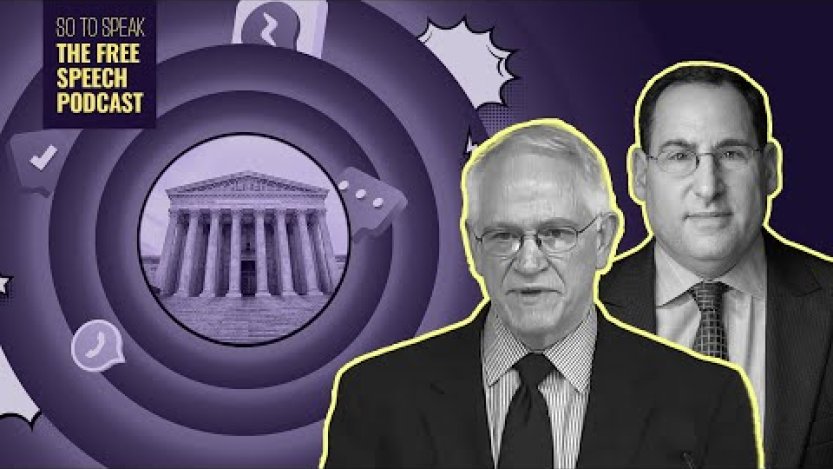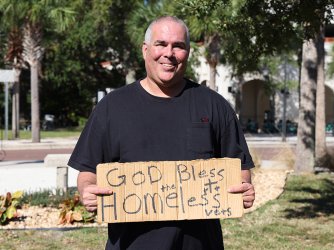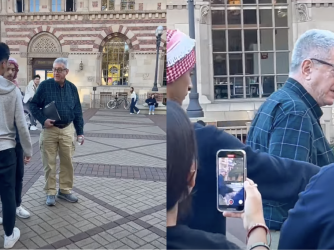Table of Contents
Chemerinsky: ‘I am a 70-year-old Jewish man, but never in my life have I seen or felt the antisemitism of the last few weeks.’ — First Amendment News 400
Noe Padilla / Journal & Courier / USA TODAY NETWORK
A Jewish man watches as demonstrators march on campus at Purdue University in West Lafayette, Indiana.
“The streets I used to walk on / Are full of broken glass.” Those words, ripped from the brand new Rolling Stones album, might well be a metaphor for the shit show going on college campuses when it comes to the Israel-Gaza catastrophe. Whichever way one turns, conflict and chaos seem to be trumping civility and consensus. The marketplace of ideas has become a bazaar of pandemonium. Yes, democracy is messy, but how messy can it become until it ceases to be democratic?
The rise of antisemitism
Things appear to be going from bad to worse: Anti-Defamation League Director Jonathan Greenblatt has noted that “there has been a 388 percent increase in antisemitism in America since Hamas’ Oct. 7 surprise attack in Israel that killed more than 1,400.” Against that backdrop comes a recent op-ed in the Los Angeles Times, one penned by Dean Erwin Chemerinsky:
I was stunned when students across the country, including mine, immediately celebrated the Hamas terrorist attack in Israel on Oct. 7. Students for Justice in Palestine called the terror attack a “historic win” for the “Palestinian resistance.” A Columbia professor called the Hamas massacre “awesome” and a “stunning victory.” A Yale professor tweeted, “It’s been such an extraordinary day!” while calling Israel a “murderous, genocidal settler state.” A Chicago art professor posted a note reading, “Israelis are pigs. Savages. Very very bad people. Irredeemable excrement . . May they all rot in hell.” A UC Davis professor tweeted, “Zionist journalists . . . have houses with addresses, kids in school,” adding “they can fear their bosses, but they should fear us more.” There are, sadly, countless other examples.

While Chemerinsky is careful to avoid calls for censorship, he justifiably feels compelled to call for the very thing that is certain to fan the flames of conflict: “There has been enough silence and enough tolerance of antisemitism on college campuses. I call on my fellow university administrators to speak out and denounce the celebrations of Hamas and the blatant antisemitism that is being voiced.”
The rise of repression
Of course, there is more to the free speech story. Enter the ACLU’s David Cole:
In recent weeks, we’ve seen a surge in efforts to punish and silence students for their speech. The Anti-Defamation League and The Louis D. Brandeis Center for Human Rights Under Law issued an open letter last week calling on university leaders to investigate pro-Palestinian student groups, alleging their speech constitutes “material support for terrorism,” punishable under federal and state law, despite no evidence to support such claims. That is why the ACLU sent its own open letter to the administrative leaders of each state’s public college system, reaching over 650 colleges and universities, expressing our strong opposition to any efforts to stifle free speech and association on college campuses. The letter unequivocally urges universities to reject calls to investigate, disband, or penalize pro-Palestinian student groups for exercising their free speech rights.
And then this from Aaron Terr over at FIRE:
[S]ome reactions to opinions about the latest escalation of the conflict have gone beyond counter-speech:
- FIRE just wrote to New York University over its apparent investigation of a student who reacted to Hamas’s attack by saying, “Israel bears full responsibility for this tremendous loss of life.”
- NYU students ripped down posters of missing Israeli hostages.
- Government officials are threatening to defund colleges over student statements blaming Israel for Hamas’s attack and demanding expulsion of students and termination of faculty who have justified or excused Hamas’s actions.
- The State University System of Florida incorrectly warned that calls for Israel “to be wiped off the map” are “criminal activity.”
- Former President Donald Trump, the leading Republican candidate for the 2024 presidential election, proposed banning those who express “open hatred against Israel and America” from college campuses.
- Officials are leaning on social media platforms to stem the spread of “violent rhetoric.”
Truth in the marketplace of candor
“Colleges are struggling to balance campus safety for their students and free speech concerns amid the hostile rhetoric around the Israel-Hamas war.” — The Hill (Oct. 31)
So it has come down to this: Antisemitism continues, chaotic clashes persist, repression endures, and, yes, counter-speech remains when possible. And yet nobody seems quite fine with it. The much-hailed marketplace of ideas has become less of an Enlightenment mechanism than a college combat zone. In the process, minds close while tempers flare. This raises a question: What if more free speech is not the answer or is not a meaningful antidote to the menacing disturbances so rampant on college campuses? What then?
Let us not speak falsely: Does anyone really believe that free speech and open debate in the conflict that has engulfed college campuses will win over many minds or quell near-riotous clashes? While this is not a call for censorship, it is a call for some realist truth in the marketplace of candor.
Related: Josh Blackman — What about ‘critical’ curricula on antisemitism?
- Josh Blackman, “Chemerinsky: ‘Nothing has prepared me for the antisemitism I see on college campuses now,’” The Volokh Conspiracy (Oct. 29)
Anti-Semitism is as old as civilization itself. It never vanishes. In every generation, anti-semitism simply manifests in different forms.
Virtually every law school has courses of critical racial studies. Query how much of that curriculum focuses on anti-semitism? Every law school has a DEI department. Query how much of that programming focuses on anti-semitism? I suspect the answer to both questions is very little. Indeed, in 2021, Stanford's DEI Department said the quiet part out loud. They do not focus on anti-semitism as not to diminish discussion of anti-black racism. And, anti-semitism is not as important because Jews can hide behind their white privilege.
Related articles
- Eugene Volokh, “Harvard Kennedy School Professor's Rejecting Students' Class Project Discussing ‘Jewish Democracy’ in Israel,” The Volokh Conspiracy (Nov. 6)
- Matthew Rice, “Jordan Promises Congressional Hearing on Antisemitism on College Campuses,” New York Sun (Nov.6)
- Michelle Goldberg, “When It Comes to Israel, Who Decides What You Can and Can’t Say?” The New York Times (Nov. 4, 2023)
- Branko Marcetic, “A Tidal Wave of State and Private Repression Is Targeting Pro-Palestinian Voices,” Jacobin (Nov. 3)
- Gabriel Diamond, Talia Dror, and Jillian Lederman, “What Is Happening on College Campuses Is Not Free Speech,” The New York Times (Nov. 3, 2023)
New book on antisemitism, free speech, and Palestinian freedom
- Rebecca Ruth Gould, “Erasing Palestine: Free Speech and Palestinian Freedom,” Verso (July 18)

How the redefinition of antisemitism has functioned as a tactic to undermine Palestine solidarity
The widespread adoption of the IHRA definition of antisemitism and the internalization of its norms has set in motion a simplistic definitional logic for dealing with social problems that has impoverished discussions of racism and prejudice more generally, across Britain and beyond. It has encouraged a focus on words over substance.
Erasing Palestine tells the story of how this has happened, with a focus on internal politics within Britain over the course of the past several years. In order to do so, it tells a much longer story, about the history of antisemitism since the beginning of the twentieth century.
This is also a story about Palestine, a chronicle of the erasure of the violence against the Palestinian people, and a story about free speech, and why it matters to Palestinian freedom.
Forthcoming book ‘reveals the damage that antisemitism does to the identity of Jewish students, staff, and faculty’
- Cary Nelson, “Hate Speech and Academic Freedom: The Antisemitic Assault on Basic Principles,” Academic Studies Press (April 9, 2024)

University campuses in North America and Europe are deeply polarized over the character of the Jewish state and the meaning of the Israeli-Palestinian conflict.
This book reveals the damage that antisemitism does to the identity of Jewish students, staff, and faculty. It is the first book to ask what the impact has been on the fundamental principles the academy relies on for its identity — academic freedom, free speech rights, standards for hiring or firing faculty members and administrators, and the ethics of academic conduct and debate.
While Hate Speech and Academic Freedom details the chilling challenges we face, it also offers policies to use in meeting them, concluding with detailed chapters on how to use the IHRA Definition of Antisemitism.
Forthcoming book on why hate speech should not be protected
- W. Wat Hopkins, “Hate Speech Is Not Free: The Case Against First Amendment Protection” Rowman & Littlefield Publishers (Feb. 20, 2024)

Hate speech has been a societal problem for many years and has seen a resurgence recently alongside political divisiveness and technologies that ease and accelerate the spread of messages. Methods to protect individuals and groups from hate speech have eluded lawmakers as the call for restrictions or bans on such speech are confronted by claims of First Amendment protection. Problematic speech, the argument goes, should be confronted by more speech rather than by restriction.
Debate over the extent of First Amendment protection is based on two bodies of law—the practical, precedent determined by the Supreme Court, and the theoretical framework of First Amendment jurisprudence. In Hate Speech is Not Free: The Case Against Constitutional Protection, W. Wat Hopkins argues that the prevailing thought that hate is protected by both case law and theory is incorrect.
Within the Supreme Court’s established hierarchy of speech protection, hate speech falls to the lowest level, deserving no protection as it does not advance ideas containing social value. Ultimately, the Supreme Court’s cases addressing protected and unprotected speech set forth a clear rationale for excommunicating hate speech from First Amendment protection.
Forthcoming book: Nadine Strossen on the ‘strongest arguments for and against protecting the most controversial speech’
- Nadine Strossen, “Free Speech: What Everyone Needs to Know,” Oxford University Press (Oct. 31)

An engaging guide to the most important free speech rules, rationales, and debates, including the strongest arguments for and against protecting the most controversial speech, such as hate speech and disinformation.
This concise but comprehensive book engagingly lays out specific answers to myriad topical questions about free speech law, and also general explanations of how and why the law distinguishes between protected and punishable speech. Free Speech provides the essential background for understanding and contributing to our burgeoning debates about whether to protect speech with various kinds of controversial content, such as hate speech and disinformation: the applicable legal tenets and the strongest arguments for and against them.
The book focuses on modern First Amendment law, explaining the historic factors that propelled its evolution in a more speech-protective direction - in particular, the Civil Rights Movement. It highlights the many cases, involving multiple issues, in which robust speech-protective principles aided advocates of racial justice and other human rights causes. The book also shows how these holdings reflect universal, timeless values, which have been incorporated in many other legal systems, and have inspired countless thinkers and activists alike.
Without oversimplifying the complexities of free speech law, the book's lively question-and-answer format summarizes this law in an understandable, interesting, and memorable fashion. It addresses the issues in a logical sequence, presenting colorful facts and eloquent language from landmark Supreme Court opinions. It will be illuminating to a wide range of readers, from those who know nothing about free speech law, to those who have studied it but seek a well-organized summary of major doctrinal rules, as well as insights into their background, rationales, and interconnections.

University of the Pacific Law Review symposium: Israel, Palestine and The First Amendment
- Omar M. Dajani, “Israel, Palestine and the First Amendment: Introduction to the Special Issue.”
- Susan Benesch, “Content Moderation Needs Auditing at Scale, Starting with Israel and Palestine.”
- Lara Friedman, “Targeting Free Speech & Redefining Antisemitism: How Pro-Israel Actors Are Using US Laws to Attack Palestinian Activism & Solidarity.”
- Brian Hauss, “The Right to Boycott as a Right of Assembly.”
- Dima Khalidi, “Attacking the Palestine Freedom Movement Means Attacking the First Amendment Too.”
- Zoha Khalili, “Should We Ban Solidarity—and Student Groups—to Avoid Offending Israel Apologists?”
- Kenneth Stern, “Academic Freedom, Boycotts, Definitions, and Democracy.”
- Mira Sucharov, “Identity, Social Justice and Learning Communities in the Age of Contested Campus Politics.”
- Eugene Volokh, “The First Amendment and Refusals to Deal.”
SCOTUS to hear NRA free speech case – Volokh counsel of record
Eugene Volokh, “S. Ct. Will Hear NRA's Case Alleging That N.Y. Government Coerced Companies to Stop Doing Business with NRA,” The Volokh Conspiracy (Nov. 3)
The case is National Rifle Association of America v. Vullo. The issue raised in it is:
Does the First Amendment allow a government regulator to threaten regulated entities with adverse regulatory actions if they do business with a controversial speaker, as a consequence of (a) the government’s own hostility to the speaker’s viewpoint or (b) a perceived “general backlash” against the speaker’s advocacy?
Professor Eugene Volokh was the counsel of record on the cert. petition.
- See “Supreme Court Will Hear an NRA Appeal in a Dispute With a Former New York State Official,” First Amendment Watch (Nov. 3)
So to Speak Podcast: Corn-Revere and London on new SCOTUS term and free speech
- “2023-24 Supreme Court Preview,” So to Speak (Oct. 25)
The Supreme Court handed down some big First Amendment victories last term. What lies ahead for the Court in the upcoming term? FIRE Chief Counsel Robert Corn-Revere and FIRE General Counsel Ronnie London join the show to discuss important First Amendment cases that will be heard during the Court's 2023-24 session.

Related
- Adam Liptak, “Supreme Court Weighs When Officials May Block Citizens on Social Media,” The New York Times (Oct. 31)
The Supreme Court worked hard in a pair of arguments on Tuesday to find a clear constitutional line separating elected officials’ purely private social media accounts from ones that reflect government actions and are subject to the First Amendment. After three hours, though, it was not clear that a majority of the justices had settled on a clear test.
More in the news
- Liz Dye, “Prosecutors Mock Trump Attempt To Get Election Case Dismissed By Shouting FIRST AMENDMENT and DOUBLE JEOPARDY,” Above the Law (Nov. 7)
- “Wisconsin Assembly to Pass GOP Bill Banning University Aid Based on Race and Diversity,” First Amendment Watch (Nov. 7)
- John O'Connor, “Ill. city tickets reporter for asking too many questions, in latest First Amendment dustup,” Free Speech Center (Nov. 6)
- “Trump Asks Appeals Court to Lift Gag Order Imposed in 2020 Election Interference Case,” First Amendment Watch (Nov. 3)
- “Newspaper publisher, reporter arrested and accused of revealing grand jury information,” Free Speech Center (Nov. 2)
- Mark Sherman, “The Supreme Court seems likely to rule against a trademark in the ‘Trump too small’ case,” Associated Press (Nov. 1)
2022-2023 SCOTUS term: Free expression and related cases
Review granted
Moody v. NetChoice, LLC / NetChoice, LLC v. Paxton / NetChoice, LLC v. Moody
National Rifle Association of America v. Vullo
Pending petitions
Sharpe v. Winterville Police Dept.
Winterville Police Department v. Sharpe
Jarrett v. Service Employees International Union Local 503, et al
Porter v. Board of Trustees of North Carolina State University
Alaska v. Alaska State Employees Association
State action
Review denied
Stein v. People for the Ethical Treatment of Animals, Inc., et al.
Blankenship v. NBCUniversal, LLC
Center for Medical Progress v. National Abortion Federation
Free speech related
Miller v. USA (pending) (statutory interpretation of 18 U.S.C. § 1512(c) advocacy, lobbying and protest in connection with congressional proceedings)
Previous FAN
FAN 399: “What’s wrong with First Amendment casebooks? Where to begin?”
This article is part of First Amendment News, an editorially independent publication edited by Ronald K. L. Collins and hosted by FIRE as part of our mission to educate the public about First Amendment issues. The opinions expressed are those of the article’s author(s) and may not reflect the opinions of FIRE or of Mr. Collins.
Recent Articles
FIRE’s award-winning Newsdesk covers the free speech news you need to stay informed.


FIRE Statement: X Corp's lawsuit and Texas's investigation into Media Matters for America are deeply misguided

Anonymous speech is as American as apple pie


